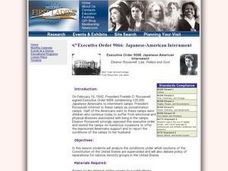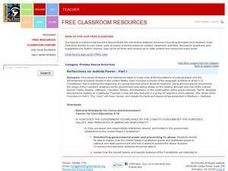Curated OER
Constitutional Convention
Students engage in a role-playing situation to illustrate the kinds of compromised that were made a teh Constitutional Convention. They write three short 1-2 paragraph arguments and then present their arguments to the class at the...
Curated OER
You Be the Judge
Students research and evaluate a case considered by the U.S. Supreme Court regarding the jurisdiction of the Clean Water Act. They watch a Bill Moyers video, conduct a debate, and write about the decision they would make if they were a...
Curated OER
Whose God?
Students investigate religious freedom in the U.S. They watch and discuss a Bill Moyers NOW video, take a Freedom of Religion quiz, write an essay, and participate in a mock trial and debate.
Curated OER
The New Republic
Students research the Federalists and Anti-federalists. In the lesson on state legislature, students use primary sources to create a brochure and write an essay that illustrates federalist and anti-federalists viewpoints.
Curated OER
Education Reform
Students identify problems and potential improvements for U.S. public school education. They research and debate the pros and cons of the "No Child Left Behind Act".
Curated OER
Gun Control and Terrorism: Laws or Loopholes?
Students examine the Second Amendment of the Constitution. They research and organize key arguments and other fundementals of gun control. They participate in a debate defending the wording of the Second Amendment.
Curated OER
US Patriot Act: Security vs. Privacy
Students use readings, worksheets and discussion to explore the ramifications of the US Patriot Act which was passed by Congress shortly after September 11th. They review Constitutional Amendments and consider how they relate to the...
Curated OER
The Kansas-Nebraska Act of 1854: Popular Sovereignty and the Political Polarization over Slavery
Why did Stephen Douglas support the Kansas-Nebraska Act of 1854? Why did Abraham Lincoln oppose it? Young historians examine how the Kansas-Nebraska Act of 1854 affected the political balance between free and slave states and explore how...
National First Ladies' Library
Executive Order 9066: Japanese-American Internment
Students analyze conditions under which sections of United States Constitution are superceded, research history of Native Americans, African Americans, and Japanese Americans, and debate policy of reparations for various minority groups...
Curated OER
The Cherokee Removal
Eleventh graders examine the issue of Cherokee removal from the perspectives of Andrew Jackson, members of Congress, and members of the Cherokee nation. They adopt the perspectives and engage in debate over the issue of Cherokee removal.
Curated OER
VA Statute for Religious Freedom, III
Students analyze the Virginia Statute for Religious Freedoms and consider its implications. In this governing principles lesson, students explore primary and secondary sources regarding the document penned by Thomas Jefferson.
Curated OER
The Alien and Sedition Acts
Pupils perform research in the wake of the attacks on the World Trade Center and the Pentagon, a debate has begun over augmented security and surveillance, versus safeguards for personal freedoms. This debate is certain to occupy our...
Curated OER
Indian Removal: The Cherokees, Jackson, and the “Trail of Tears”
Students examine executive power. In this Indian Removal lesson, students listen to their instructor present a lecture regarding the "Trail of Tears". Students respond to discussion questions regarding the lecture.
Curated OER
A Hero Betrayed: The Presidency of Ulysses S. Grant
Students analyze the career of Ulysses S. Grant. In this Grant presidency instructional activity, students listen to their instructor present a lecture regarding the details of Grant's presidency. Students respond to discussion questions...
Curated OER
The Great "What If" Question. How might American history have been different had Lincoln lived?
Young scholars examine the impact of the assassination of President Lincoln. After researching the Republican positions on Reconstruction and analyzing documents related to the Reconstruction, students take a position and explain their...
Curated OER
The Marshall Plan for Rebuilding Western Europe
High schoolers examine the aftermath of World War II. In this Marshall Plan lesson, students listen to their instructor present a lecture regarding the plan to rebuild Western Europe and its outcome. High schoolers respond to discussion...
Constitutional Rights Foundation
If Men Were Angels: Teaching the Constitution With the Federalist Papers
Much like the methods of group work, the writers of the Federalist Papers worked together to advocate for their viewpoints against the anti-federalists. The resource enables learners to break into small groups and conduct research before...
Heritage Foundation
Procedural Amendments: Amendments III, IV, and V
So many US Constitution clauses, so little time. The 17th installment in a 20-part series teaches pupils about the Third, Fourth, and Fifth Amendments. Learning through activities such as group work, connecting to current events, and...
Curated OER
The First Amendment: What's Fair in a Free Country
Students describe the contents of the First Amendment while telling about an example of speech that is protected by the Constitution and that which is not. They attempt to apply the First Amendment to situations that could occur in their...
North Carolina Consortium for Middle East Studies
Federalists v. Anti‐Federalists
Here is a solid lesson plan to support your instruction on the Continental Congress and the Articles of Confederation. It includes close analysis of primary source images, a guided notes template and answer key, and many key points to...
Curated OER
In Congress Assembled: Continuity and Change in the Governing of the United States
Students interpret history using primary resources and secondary research. The Constitution is examined and changes are explained within the time period they were made.
Curated OER
Reflections on Judicial Power - Part I
Students research the Constitutional provision for the Judicial branch of government. They examine different U.S. founder's positions on the relative strength of the judicial branch and act as a review court for Marbury vs. Madison.
Curated OER
The U.S. Constitution:Continuity and Change in the Governing of the United States
Students interpret historical evidence presented in primary and secondary resources. In this U.S. Constitution lesson, students examine and analyze primary sources regarding the plan for U.S. government.
Curated OER
Understanding James Madison The Father of the Constitution
Learners research James Madison and create a table of his strengths and weaknesses. For this James Madison lesson, students read Jean Fritz's, The Great Little Madison, while developing their research skills, vocabulary strategies, and...

























